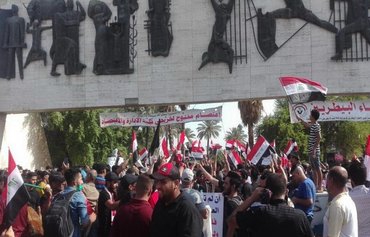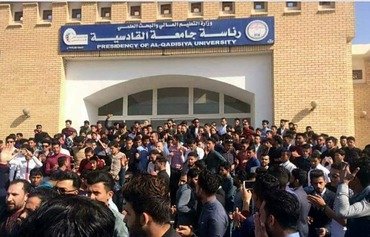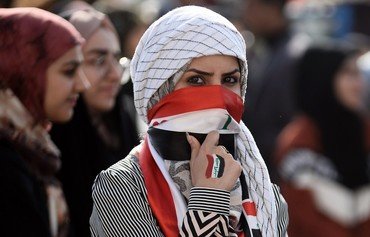Iran-backed militias have been paying poor Iraqis to take part in demonstrations and events that support Iran's foreign policy, Iraqi officials and residents tell Diyaruna.
Militias such as Harakat al-Nujaba, Asaib Ahl al-Haq and Sayyed al-Shuhada Brigade, have also been bribing residents with food and forcing some school principals to send their students out to participate in pro-Iran events, they said.
As participation in past events had dwindled, these militias have been resorting to bribing Iraqis in impoverished areas of Baghdad, Basra and Najaf, an official with the Iraqi Ministry of Interior told Diyaruna.
"Three events were recently held by the militias in Baghdad, another one in Najaf and two in Basra, where poor residents were paid to attend," the official, who asked to remain anonymous, said.
The events included al-Quds Day demonstrations, sponsored by the Iranian regime every year in countries where it wields influence and held this year on May 31st, he said.
They also included protests against the sanctions imposed on Iran; another demonstration demanding that Saudi Arabia be denied permission to open a consulate in Najaf; and more recently a speech by Asaib Ahl al-Haq commander Qais al-Khazaali.
"More than 70% of the participants [at these events] were given either money or a meal," the official said.
'People have changed'
Militias usually use school students as an audience for their events, "but since schools are out for the summer, they resort instead to paying people to take part in their events", said Ahmed Abbas al-Taie, member of the Iraqi Civil Movement.
The government should address this issue as the militias are "exploiting the poor’s financial needs, involving them in dangerous political activities, falsifying the facts and misleading the public", he told Diyaruna.
This practice is not new, Iraqi jounalist Baraa al-Shammari said, but it was limited to the period of elections when political parties would pay people to attend rallies and events.
"However, armed groups now find themselves forced to resort to this tactic as they try to boast about the size of the turnout at their headquarters and the number of people who respond to their calls and events," he told Diyaruna.
People have changed and these demonstrations and events no longer have the same appeal or draw turnout from citizens, he said. "On the contrary, citizens are accusing the militias of banditry and of disrupting their businesses."
Therefore, the militias have been having to pay each demonstrator around 10,000 Iraqi dinars ($8) or distributing meals for free during the demonstrations or events, said al-Shammari.
"In the past, sectarian sentiments were enough to get people to participate," he said, "but these calls are no longer persuasive to people who are weary of the militias and their slogans, at a time when the country needs services, security and equality".
'Low popularity'
These groups can no longer rally the street, particularly in the south of Iraq, said Ali Ghaleb, an expert in Iraqi affairs.
The militias want to involve Iraqis in issues they have nothing to do with that relate to Iran's foreign policy, he told Diyaruna.
Iraqis see the leaders of those militias and their relatives living in luxury "while they are asked to sacrifice their blood", he said.
The militias' popularity is low, "so they use money to persuade the poor and needy [to support them]", Ghaleb said, adding that exploiting vulnerable people is immoral.
Mohammed Jaber, 59, a repairer of fuel-operated heaters who lives in Sadr City district in eastern Baghdad, said he recently received 10,000 Iraqi dinars to take part in a demonstration in Baghdad.
Others in his group included "Hajji Reda" who works in the sewage sector, and Umm Mohammed who provides for the children of her martyred soldier son by selling cigarettes on the sidewalk, Jaber told Diyaruna.
"I did not know what the demonstration was for," he said. "Most of the people there had boarded a bus and there was a man in a military uniform handing out money to us one by one."
"He threatened that they would know if any of us left before the demonstration ended and would take the money from whoever leaves," said Jaber.
"I found out after I got there that the demonstration was to protest the war on Iran and to praise that country and support its policies," he said.
"Frankly, I did not even know that there was a threat to Iran or that a war was brewing until after I took part in the demonstration, and the same is true for the others who boarded the bus with me," he added.

![Iraqi youth participate in a rally organised by the Iran-backed Harakat al-Nujaba in Najaf in 2016. The militia has been bribing poor people to attend its events after attendance has dwindled in recent months. [Photo circulated online]](/cnmi_di/images/2019/06/25/18670-iraq-nujaba-militia-600_384.jpg)







Please, I need the results of challenges against middle three 2019 exams, first round, second al-Karkh.
Reply1 Comment(s)